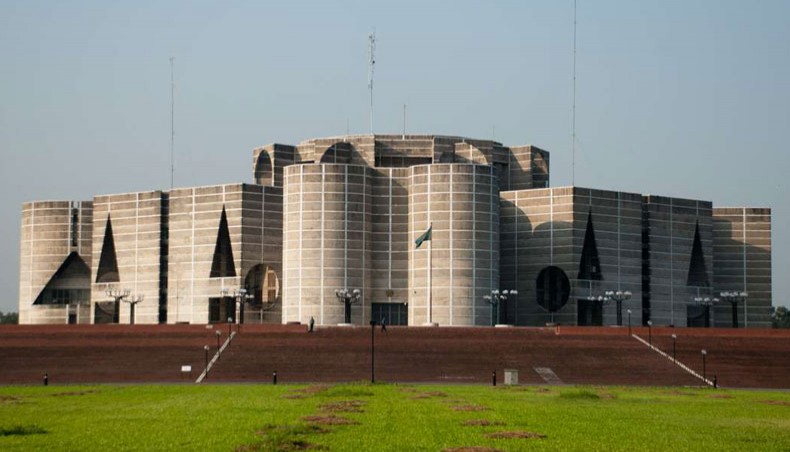Bangladesh parliament passes Digital Security Bill
The Jatiya Sangsad on Wednesday passed the much-talked about Digital Security Bill 2018 ignoring the concern of the journalists on eight sections.
Posts, telecommunications and information technology minister Mustafa Jabbar placed the bill before for immediate passage.
The house with speaker Shirin Sharmin Chaudhury in the chair passed the bill by voice votes, rejecting all amendment proposals excepting one on section 43 placed by Jatiya Party’s MP Fakhrul Imam.
The minister accepted Imam's amendment to Section 43.
Main opposition Jatiya Party MPs, including Fakhrul Imam, Nurul Islam Omar, Nure Hasna Lily Chowdhury, Mahjabeen Morshed, Selim Uddin, Shamim Haider Patwari, termed the bill as a crucial one.
They said some of the section of the bill will greatly hamper the freedom of speech.
They proposed the house to send back the bill again to the concerned parliamentary standing committee and take public opinions further.
The Editors’ Council on Sunday in a statement rejected the Digital Security Bill, 2018 as the sections 8,21,25,28,29,31,32, and 43 in the bill posed serious threats to freedom of expression and media operation.
Taking the floor, Jabaar said, ‘This law is not for controlling the media rather this law is to control the crimes through digital devices.’
The proposed law has a provision of life term imprisonment or Tk 1 crore fine or both for breaching official secrecy.
Section 32 (1) mentions that if any individual under the Official Secrets Act, 1923 commits any crime through a digital device, he/she will be awarded 14 years jail or Tk 25 lakh fine or both.
Section 32 (2) mentions that if the individual commits the same crime for the second time, he/she will be awarded life term jail or Tk 1 crore fine or both.
Section 21 of the law says anyone spreading negative propaganda against the Liberation War or the Father of the Nation, National Anthem and national flag, using digital devices or instigating to do so, will risk being sentenced to up to 1o years in jail or fined up to Tk 1 crore or both.
He or she will face up to life sentence or Tk 3 crore in fine or both for committing the offence for the second time, it says.
According to Section 25 of the proposed law, a person may face up to three years in jail or Tk 3 lakh in fine or both if he is found to have deliberately published or broadcast in a website or electronic form something which is attacking or intimidating or which can make someone feel disgruntled; knowingly published or broadcast false and distorted (full or partial) information to annoy or humiliate someone; knowingly published or broadcast false and distorted (full or partial) information to tarnish the image of the state or to spread rumours.
Second-time offenders will face up to five years in jail or Tk 10 lakh fine or both.
As per the bill, digital forensic labs, and a digital security agency under the prime minister’s office will be set up, while a national computer emergency response team and an 11-member digital security council, headed by the prime minister, will be constituted.
The much-debated Digital Security Bill, 2018 was placed in parliament on April 9 amid growing concerns from journalists and rights activists over some contents of the law.
Amid a concern of journalists, the parliamentary standing committee first invited the stake-holders on May 22 to have their views on the bill.
Attending the meeting, journalist leaders voiced concern over section 8, 21, 25, 28, 29, 31, 32, and 43 of the proposed law.
They said these sections would greatly hamper the freedom of speech.
News Courtesy: www.newagebd.net











